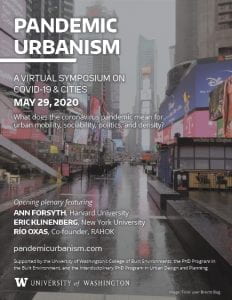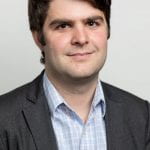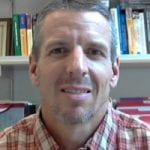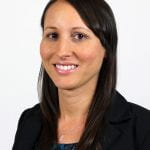For a recent feature story on the Pandemic Urbanism Symposium, Graduate School Communications Specialist Kate Stringer interviewed Professor Qing Shen, Director of the Interdisciplinary Ph.D. in Urban Design & Planning. Read the full interview here.
1. How do you see the study of Urban Design and Planning changing for graduate students due to the broad impacts of COVID-19?
Graduate students in Urban Design and Planning come from quite diverse academic backgrounds, but their interests converge around their desire to enhance quality of life and sustainability through improving the built environment and creating opportunities for economic and social development in urban areas. I think COVID-19 will lead to significant changes in the study of Urban Design and Planning for students, because they have witnessed not only the devastation caused by the pandemic but also the apparent connection between those impacts and the ways in which we design, plan, and operate our cities. For example, there is evidence that a very high percentage of people infected by this virus are essential workers who cannot work from home, which suggests likely vulnerabilities due to existing urban land use patterns and transportation systems. Naturally, many students are asking what Urban Design and Planning can do to reduce these vulnerabilities and increase the resiliency of our cities, which will likely face continuous threats from pandemics. Unless this imminent question is appropriately addressed, the ideal of enhancing urban life and sustainability seems to have run into a stumbling block.
Our Ph.D. students will explore ways to address vulnerabilities through advanced research, drawing from the immense intellectual resources the University of Washington has to offer. As students in one of the Graduate School’s interdisciplinary Ph.D. programs, they typically work with faculty from multiple disciplines to gain a new understanding of urban problems and develop innovative approaches for urban design and planning practice. Indeed, a number of them are starting to work on research projects aimed at responding to the impacts of COVID-19, with faculty investigators from College of Built Environments, College of Engineering, and School of Public Health. These projects examine a range of major impacts of COVID-19, including those on rental housing, public transportation, and essential businesses and services. In the longer term, some students will likely focus their research on how to better prepare cities for future pandemics through urban design and planning innovations, which could take a variety of forms, such as new technical standards and regulations for urban land use and transportation services, strengthened community organizations and social networks for emergency response and resiliency, and more generally improved mechanisms for policymaking at local levels in response to pandemics. These systems need to work together complementarily.
2. When thinking of the disruptions COVID-19 will cause to cities, are there any past models to look at to see how something similar might have played out?
Throughout human history, cities have experienced many types of disruptions, including wars, famines, earthquakes, volcanoes, floods, and pandemics. Some past human suffering has translated into knowledge and wisdom that can guide effective preparation for – and prompt response to – various natural and human-made disasters. Over the last half century in particular, many academic disciplines, including urban design and planning, have contributed to the development of conceptual models and analytical tools in response to perceived and actual disasters. These include, for example, models of scenario planning and models of resilience, which have some level of general applicability to different types of disruptions. In addition, there have been many scholarly reflections on urban design and planning theory and practice based on recent major hazards and disasters, including Hurricane Katrina in New Orleans and Wenchuan Earthquake in Sichuan, China. However, pandemics such as COVID-19 have their own unique characteristics, which make their impacts unprecedentedly devastating in scale and speed. Therefore, simply adopting a prior model as a response would prove insufficient and inadequate. We will have to build upon, and significantly expand, our knowledge base to be effective in helping cities and their residents to prepare for, and recover from, this kind of drastic interruption to normal life.
3. What is the importance of holding this symposium for the Urban Design and Planning community?
This symposium is important for Urban Design and Planning students, researchers, and practitioners because it is a timely call for reexamining some existing concepts and approaches. Whether for short-term coping, medium-term recovery, and long-term sustainability, cities must respond to the impacts of pandemics and address existing vulnerabilities. As one of the world’s leading research universities with distinctive interdisciplinary strengths in Urban Design and Planning scholarship, we are well-positioned to be a leader in facilitating a major dialog on this extremely important topic. The symposium will provide a forum for our students and faculty to exchange their ideas with the world’s thought leaders in this area. This event will definitely be informative and inspiring.





